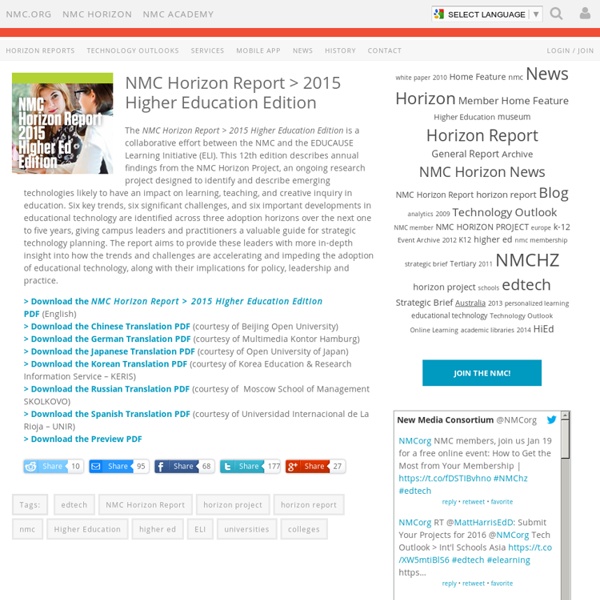2015 Higher Education Edition
The NMC Horizon Report > 2015 Higher Education Edition is a collaborative effort between the NMC and the EDUCAUSE Learning Initiative (ELI). This 12th edition describes annual findings from the NMC Horizon Project, an ongoing research project designed to identify and describe emerging technologies likely to have an impact on learning, teaching, and creative inquiry in education. Six key trends, six significant challenges, and six important developments in educational technology are identified across three adoption horizons over the next one to five years, giving campus leaders and practitioners a valuable guide for strategic technology planning. The report aims to provide these leaders with more in-depth insight into how the trends and challenges are accelerating and impeding the adoption of educational technology, along with their implications for policy, leadership and practice.
Preparing for the digital university
George Siemens, Dragan Gasevic and Shane Dawson have produced an excellent report with this title. I think it’s a very ambitious and also very timely thing to do. They synthesise the research of distance, blended and online learning to provider an analysis of the benefits and issues for each. As nearly all universities offer one or more versions of these forms of learning, it is very useful to have a report to start from. As we’ve often voiced in the OER field, there is a lot of research published that is of questionable quality, and in order to make good decisions we need to be drawing on sound evidence. So, I applaud their efforts and what I offer here is by way of an addendum, not a major criticism. i) The discussion of distance education seems to be focused on correspondence tuition and then jumps straight from here to interactive, online modes. ii) The report states that distance learning has high retention.
General
Contemporary Issues in Technology & Teacher Education has a whole new look, and article URLs have changed. We have found 2 articles that may match the URL you entered or followed: by Matthew J. Koehler, Michigan State University; & Punya Mishra, Michigan State University This paper describes a framework for teacher knowledge for technology integration called technological pedagogical content knowledge (originally TPCK, now known as TPACK, or technology, pedagogy, and content knowledge). by Leanna Archambault, Arizona State University; & Kent Crippen, University of Nevada Las Vegas With the increasing popularity and accessibility of the Internet and Internet-based technologies, along with the need for a diverse group of students to have alternative means to complete their education, there is a major push for K-12 schools to offer online courses, resulting in a growing number of online teachers.
Qualitymodels.pdf
Special Collection: "Distance learning, openness and educational technology"
Special Collection Collection launched: 4 Mar 2015 This special collection consists of invited papers from the first Regius symposium on Open Education, sponsored by the CALRG. This special collection consists of invited papers from the Regius symposium held at the Open University as part of the annual conference of the Computers and Learning Research group.
How Do We Meet Today's Online Education Challenges?
Online education is an expanding industry at all levels. From K-12 to higher ed we’re seeing the benefits of educational technology and Internet access, but not without a few challenges to continued growth and acceptance. Identifying the best possible strategies for online education initiatives is a common goal for instructors, students, course designers, administrators, and technologists alike. What are you most concerned about right now? My thanks (and an apology) to someone in my professional learning network (whose name I’ve long forgotten), for posting this question online recently. This is the question that inspired the #IOLchat session I mentioned previously. Changing Demographics Students are increasingly non-traditional (i.e., older), even on college campuses. Technology skills are a concern. Lack of Authentic Learning Experiences Online courses can become static presentations of information with quizzes to evaluate reading comprehension and concept understanding. Staying Relevant
Distance-Educator.com | Access to over 14,000 citations, scholarly research, journals, and media related to distance education
Online Distance Education: Towards a Research A...
Related:
Related:



